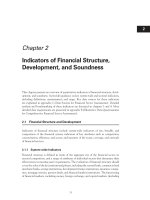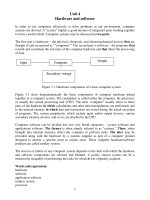Blood and Iron ppt
Bạn đang xem bản rút gọn của tài liệu. Xem và tải ngay bản đầy đủ của tài liệu tại đây (605.41 KB, 180 trang )
Chapter I
Chapter II
Chapter III
Chapter IV
Chapter V
Chapter VI
Chapter VII
Chapter VIII
Chapter IX
Chapter X
Chapter XI
Chapter XII
Chapter XIII
Chapter XIV
Chapter XV
Chapter XVI
Chapter XVII
Chapter XVIII
CHAPTER I
CHAPTER II
CHAPTER III
CHAPTER IV
CHAPTER V
CHAPTER VI
CHAPTER VII
CHAPTER VIII
CHAPTER IX
CHAPTER X
CHAPTER XI
CHAPTER XII
1
CHAPTER XIII
CHAPTER XIV
CHAPTER XV
CHAPTER XVI
CHAPTER XVII
CHAPTER XVIII
Blood and Iron, by John Hubert Greusel
The Project Gutenberg EBook of Blood and Iron, by John Hubert Greusel This eBook is for the use of anyone
anywhere at no cost and with almost no restrictions whatsoever. You may copy it, give it away or re-use it
under the terms of the Project Gutenberg License included with this eBook or online at www.gutenberg.org
Title: Blood and Iron Origin of German Empire As Revealed by Character of Its Founder, Bismarck
Author: John Hubert Greusel
Release Date: July 21, 2009 [EBook #29473]
Language: English
Character set encoding: ISO-8859-1
*** START OF THIS PROJECT GUTENBERG EBOOK BLOOD AND IRON ***
Produced by Markus Brenner, Irma Spehar and the Online Distributed Proofreading Team at
(This file was produced from images generously made available by The Internet
Archive/American Libraries.)
BLOOD and IRON
Origin of German Empire As Revealed by Character of Its Founder, Bismarck
BY
JOHN HUBERT GREUSEL
THE SHAKESPEARE PRESS 114-116 E. 28th St. New York 1915
Copyright, 1915, John Hubert Greusel
Dedicated to Stella My Wife
CONTENTS
BOOK THE FIRST: BISMARCK'S HUMAN ESSENCE
Blood and Iron, by John Hubert Greusel 2
Chapter I
The Man Himself 1. The Giant's Ponderous Hammer 2. Grossly Human Is Our Bismarck 3. Despite Political
Bogs 4. Genius Combined with Foibles
Chapter I 3
Chapter II
Blood Will Tell 5. Iron-headed Ancestry 6. Animal Basis of Rise to Power 7. "The Wooden Donkey Dies
Today!"
Chapter II 4
Chapter III
The Gothic Cradle 8. The Child of Destiny 9. Soft Carl, Spartan Louise
Chapter III 5
Chapter IV
Sunshine and Shadow 10. Amazing Powers of Hereditary Traits 11. The Wolf's Breed 12. Twenty-eight
Duels! 13. Fizzle of First Official Service
BOOK THE SECOND: THE GERMAN NATIONAL PROBLEM
Chapter IV 6
Chapter V
The Great Sorrow 14. The German Crazy Quilt 15. The Diamond Necklace
Chapter V 7
Chapter VI
Prussia's De Profundis 16. The Lash and the Kiss 17. The Prussian Downfall 18. Prussia Becomes Germany
19. Kingcraft Comes Upon Evil Days 20. The Star of Hope 21. The King Keeps Reading His Bible 22. The
Deluge
BOOK THE THIRD: BISMARCK SUPPORTS HIS KING
Chapter VI 8
Chapter VII
Fighting Fire with Fire 23. Voice in the Wilderness 24. The Young Giant 25. Speechless for One Whole
Month 26. Bellowing His Defiance
Chapter VII 9
Chapter VIII
Bismarck Suffers a Great Shock 27. Bismarck Scorns French Political Millennium 28. Militarism as
National Salvation 29. King Marches with Mob!
Chapter VIII 10
Chapter IX
So Much the Worse for Zeitgeist 30. Not Politics Human Nature 31. Setting Back the Century Clock 32.
The Master at Work 33. Bismarck Nudges His King 34. Mystical High-flown Speeches
BOOK THE FOURTH: BLOOD IS THICKER THAN WATER
Chapter IX 11
Chapter X
Socrates in Politics 35. The Frankfort School of Intrigue 36. Preparing for German Unity 37. Tyrants Are
Necessary 38. Bismarck, in Naked Realism
Chapter X 12
Chapter XI
The Mailed Fist 39. Democracy Stems from Aristocracy 40. Parallel Elements of Power
Chapter XI 13
Chapter XII
By Blood and Iron! 41. The Man of the Hour 42. Rough and Tumble 43. On Comes the Storm 44. Bismarck
Decides to Rule Alone
Chapter XII 14
Chapter XIII
The Dream of Empire 45. Bismarck Tricks Them All 46. Prussian Domination Essential 47. By Faith Ye
Shall Conquer 48. Was Bismarck a Beast?
BOOK THE FIFTH: THE GERMAN PEOPLE ARE ONE AND UNITED
Chapter XIII 15
Chapter XIV
Windrows of Corpses 49. Devil or Saint, Which? 50. Sleeping Beside the Dead 51. The Rejected Stone 52.
His Ikon? 53. "The Dying Warrior" 54. Sadowa Summed Up 55. Manure
Chapter XIV 16
Chapter XV
The Great Year, 1870 56. "These Poor Times" 57. The Bugle Blast 58. Bismarck's Ironical Revenge 59. The
Weaver's Hut 60. Zenith!
Chapter XV 17
Chapter XVI
The Versailles Masterpiece 61. The Kaiser's Crown 62. Divine-right, a Politico-Military Fact
BOOK THE SIXTH: ONCE A MAN AND TWICE A CHILD
Chapter XVI 18
Chapter XVII
The Downfall 63. Bismarck's Secret Discontent 64. "Who Made United Germany?" 65. The Irony of Fate
66. Last Illusion Dispelled 67. Binding Up the Old Man's Wounds 68. Awaiting the Call 69. Refuses to Pass
Under the Yoke 70. Glory Turns to Ashes
Chapter XVII 19
Chapter XVIII
Hail and Farewell 71. His Final and Most Glorious Decoration 72. "As One Asleep"
BOOK THE FIRST
Bismarck's Human Essence
Chapter XVIII 20
CHAPTER I
The Man Himself
1
Hark, Hark! The giant's ponderous hammer rings on the anvil of destiny. Enter, thou massive figure,
Bismarck, and in deadly earnest take thy place before Time's forge.
¶ It is, it must be, a large story big with destiny! The details often bore with their monotony; they do not at all
times march on; they drag, but they do indeed never halt permanently; ahead always is the great German
glory.
¶ Forward march, under Prince Bismarck. He is our grim blacksmith, looming through the encircling dark,
massive figure before Time's forge.
The sparks fly, the air rings with the rain of blows: he is in deadly earnest, this half-naked, brawny Prussian
giant; magnificent in his Olympian mien; his bellows cracking, his shop aglow with cheery-colored sparks as
the heavy hammer falls on the unshapen ores on the big black anvil.
¶ Thus, toiling hour after hour in the heat and sweat, our Pomeranian smith with ponderous hammer beats and
batters the stubborn German iron into a noble plan for a great Nation!
* * * * *
¶ From a human point, we do not always see the ultimate glory.
For that is obscured by dark clouds of party strife, extending over years, the caprices of men and the interplay
of ambitions both within and without the distracted German lands. Russia, Austria, Italy, Great Britain,
France, Spain, have their spies engaged in all the under-play of political intrigue; there are a thousand enemies
at home and abroad, in camp, court and peasant's cottage.
¶ And at times, weary of it all, we throw down the book convinced that, in a welter of sordid ends, the cause is
lost in shame.
But, somehow, some way, Germany does in truth ultimately emerge triumphant, in spite of her amazing errors
and the endless plots of enemies.
She does indeed justify her manhood and thus the Bismarck story is of imperishable glory.
* * * * *
¶ We say that Bismarck had to re-inspire the Germans to be a fighting nation.
What we mean is that the spirit of the ancient Teutons had to be aroused; for though it slumbered for
centuries, it never died.
Rome found that out when she was still in her infancy; the Germans burnt the town by the Tiber; and the
fearsome struggle between the Romans and the Germanic tribesmen lasted almost unbroken for nearly five
centuries.
¶ The Romans regarded the Germans as the bravest people in the world.
CHAPTER I 21
The migrations of the Cimbri and Teutones, and the frightful struggles in which after superhuman endeavors
the Roman Marius destroyed his German enemies is one of the heroic pages of all history. It was a
hand-to-hand contest, and torrents of human blood ran that day. Menzel tells us, (Germany, p. 85), that the
place of battle enriched by a deluge of blood and ultimately fertilized by heaps of the slain, became in after
years the site of vineyards whose wines were eagerly sought by connoisseurs.
¶ The Cimbri were drawn up in a solid square, each side of which measured 7,000 paces. The foremost ranks
were fastened together with chains, that the enemy might not readily break through. Even the German dogs
that guarded the baggage train fought with animal ferocity. The battle went against the Germans and the
slaughter was frightful. When all was lost, the Germans killed their women and children, rather than see them
fall into the hands of the Romans. German courage inspired terror and created foreboding throughout the
Roman world. It is a heroic story and sustains the German tradition that Germans born free under their ancient
oaks never will be slaves, though the whole world is against them.
The success varied, but the Germans conquered, even in death, becoming lineal descendants of the Empire.
And on the ruins were builded the German nation, as the successor of the old Holy Roman Empire.
* * * * *
¶ We picture to you these shadowy glimpses of remote battle-scenes to show you that Germans were ever
fighting men, who preferred death to loss of liberty.
On the ruins of Roman imperial glory, Teutonic conquerors founded an Empire that defied time and chance
for upwards of 1,000 years; then there crept in a peculiar dry rot. The ancient German oak died at the top.
Along came Napoleon, hacking away the limbs and scarring the gnarled trunk with fire and sword. The ruin
seemed complete. Dead at the top, dead at the root, men said. And what men say is true. There is no longer a
Germany, except as a mere geographical designation; when you speak of the German Empire you recall
merely the echo of a once mighty name.
It now becomes Bismarck's solemn duty, fortified by a noble appreciation of the ancient legend, to make the
German oak green again in its immortal youth. And he watered the roots with blood.
¶ We cannot tell you the great story in a few baby-sentences; you must read and grasp the broad spirit as it
gradually unfolds. Bismarck in the crudity of his early inspiration scarcely finds himself for years. But all the
while he is holding fast to the idea that the Fatherland should under God be free and united, sustained by the
ancient Teutonic brotherhood in arms.
We present him in part as a tyrant, a wild, intolerant spirit, working his own plans to be sure, but those plans
in the end are to redound to the good of the nation he long and unselfishly serves.
We ask you to see him in his weakness and we hope with some of his strength, always with his high purpose.
We ask you to behold him as a man with all a strong man's frailties and faults. We do not spare him. We paint
him black, now and then, deliberately, that you may know how very small ofttimes are the very great; also to
realize that if we are to wait for perfect human beings to front our reforms then those reforms will never be
made.
Bismarck is too great a man to be belittled by the glamour of spurious praise for spurious virtues.
It was not necessary for him to cease to be a human being in order to carry out his work. He remained, to the
end, grossly human, for which the gods be praised.
CHAPTER I 22
2
Grossly human is our Bismarck, whose lust for control is idiomatic; let us get this clearly, first of all.
¶ Did you ever see a bulldog battle with one of his kind? The startling fact is this: The dog suddenly develops
magnificent reserve force, making his battling blood leap; is transformed into a catapult, bearing down his
adversary or by him borne down it matters not which! for the joy of battle. To fight is the realization of his
utmost being.
¶ A peculiar fact known to all admirers of a fighting bulldog is this: The dog during the fight, looks now and
then at his master near-by, as much as to say, "See how well I fight!"
¶ Thus Bismarck looked at his King.
* * * * *
¶ The nature of the pit bulldog is seen in Bismarck's head. His surly face inspires a sense of dread. There is
that in his physiognomy that shows his ugly disposition, when aroused. If you saw that moody face in the
crowd, one glance would be sufficient to make you feel how vituperative, short, sharp, murderous the
unknown man could be, on occasion.
¶ Yet the fear stirred by the sight of a pit bulldog is ofttimes largely illusionary. The dog at heart is genial in a
brute way, and never a more loyal servant than the bulldog to his friends devoted even to death, to his master.
¶ It is the sense of dread in the bulldog's head that strikes home! So with Bismarck's physiognomy. The Iron
Chancellor had but to come into the room to make his onlookers experience uneasiness. There was an
ever-present suggestion of pent-up power, that could in an instant be turned upon men's lives, to their
destruction!
¶ It is true that Bismarck had his genial side, but it cannot be said that he drew and held men to him. He had
thousands of admirers to one friend. During the greater part of his life he was either hated or feared at best,
misunderstood. Like the pit bulldog, Bismarck was born to rule other lives and he fulfilled his mission.
¶ The element of absolutism in the man, his uncompromising severity, his command of the situation
regardless of cost, sorrow or suffering to other men, is seen in his realistic physiognomy. We study these facts
more and more, as we go along.
* * * * *
¶ There was always something imperious about this great man. He brooked no interference. His excessive
dignity compelled respect. He never allowed familiarities; you could not safely presume on his good nature.
He never permitted you to get too near. This abnormal self-confidence conveyed the idea that this giant in
physique and in intellectual power was truly cut out for greatness.
One of his favorite pranks, as a boy, was to amuse himself making faces at his sister; he could frighten her by
his queer grimaces.
From early youth, he was accustomed to take himself very seriously, and by his offensive manners conveyed
an immediate impression of the ironical indifference in which he held humanity, in the mass.
¶ He was a born aristocrat, in a sense of high, offensive partisanship.
CHAPTER I 23
¶ Men shrank from him, cursed him, reviled his name; but they respected his intellect, even in the early days
when he used his power in an undisciplined way; yes, was painfully learning the business of mastering human
lives.
¶ The brute in the man loomed large; the unreasoning but magnificent audacity of the bulldog expressed itself
in scars, wounds, deep-drinking bouts, fisticuffs, and in twenty-eight duels.
¶ But he had another kind of courage, greater in import than that expressed by physical combat.
* * * * *
¶ When we say Bismarck's work is a revelation of his will to power, we emphasize again how unnecessary it
is to make him either less or more than a human being. There is a school of writers that never mentions his
name except with upturned eyes, as though he were a demigod. The tendency of human nature is to idealize
such as Bismarck out of all semblance to the original, creating wax figures where once were men of flesh and
blood.
¶ Men rise to power largely in uniform ways; that psychic foundation on which they draw is always grossly
human, rather dull when you understand it, always conventional; and the great Bismarck himself is no
exception.
¶ In doing his work, Bismarck is following the psychic necessities of his character; is acting in a very personal
way, upheld always by the soldier's virtue, ambition. There is also a large element of self-love. His idiomatic
lust for control is to be accepted as a root-fact of his peculiar type of being. And while on the whole his
ambition is exercised for the good of his country, herein he is acting, in addition, under the ardent appetite, in
his case a passion, to dominate millions of lives; urged not perhaps so much from a preconceived desire to
dominate as from an inherent call to exercise his innate capacity for leadership.
¶ Making allowance for the idea that Bismarck is a devoted servant of the King of Prussia, it is not necessary
to believe that Bismarck poses as the Savior of his country. In fact, he distinctly disavows this sacrifice, has
too much sense to regard himself from this absurd point of view.
¶ The words carved on Bismarck's tomb at his own request, "A Faithful German Servant of Emperor William
I," show that however much other men were unable to comprehend the baffling Bismarckian character, the
Iron Chancellor himself had no vain illusions.
¶ When he was 83 and about to die, the old man taking a final sweep of his long and turbulent life, asked
himself solemnly: "How will I be known in time to come?"
¶ Fame replied: "You have been a great Prince; an invincible maker of Empire, you have held in your hand the
globe of this earth; call yourself what you will, and I will write a sermon in brass on your tomb."
¶ But the Iron Chancellor, after mature reflection, decided that his entire career, with all its high lights and its
deep shadows, could be expressed in four simple words, "A Faithful German Servant." He knew exactly what
he was, and how he would ultimately be represented in history.
¶ Think what this means. On those supreme questions of Life and Time involving the interpretation of
Destiny a problem hopelessly obscure to the average man Bismarck brought a massive mind charged with a
peculiar clairvoyance; often, his fore-knowledge seemed well-nigh uncanny in its exact realism; and if you
doubt this assertion, all we ask is that you withhold your verdict till you have read Bismarck's story, herein set
forth in intimate detail.
CHAPTER I 24
¶ How clear the old man's vision to discern behind all his Bismarckian pomp and majesty, in camp, court and
combat, only the rôle of faithful servant.
¶ The phrase on his tomb proclaims the man's great mind. His overbrooding silence, as it were, is more
eloquent than sermons in brass.
* * * * *
¶ In studying Bismarck, the man, we merge his identity in the events of his time; but we must sharply
differentiate between the events and the man. We incline to the belief that hereditary tendencies explain him
more than does environment. It is Bismarck as a human being, and not the tremendous panorama of incidents
leading to German sovereignty that always holds our interest. Life is life, and is intensely interesting, for its
own sake.
Thus, we are at once freed from a common fallacy of biographical writing that vicious mental attitude, as
vain as it is egotistical on part of the over-partial historian, who would warp some manifest destiny on human
life.
¶ Bismarck needs no historical explanation, no reference to hackneyed categories in the card-index of Time.
Whether his plan was dedicated to this world or to the glory of some invisible God, you may debate as you
will, but Bismarck will be neither greater nor less because of flights of your imagination.
¶ He is a great man in the sense that he did large things, but this does not make him other than he is, nor does
his story lose because we know him to be grossly human in his aims. His life does not borrow anything
because a certain type of mind professes to see behind Bismarck's history, as indeed behind the careers of all
great men, some mysterious purpose apart and beyond human nature's daily needs. It was not necessary for
Bismarck to cease to be a human being, to accomplish what he accomplished.
* * * * *
¶ Also, for the reason that Bismarck was a genius, he is an exception to conventional rules covering the
limitations of little men.
¶ Bismarck was a born revolutionist. Look at his terrible jaw, which, like the jaws of the bulldog, when once
shut down never lets go till that object is in shreds.
¶ He was a true bulldog in this that, like the thoroughbred bulldog, Bismarck favored one feed a day. He took
a light breakfast, no second breakfast, but at night would eat one enormous meal.
The bulldog follows a similar practice, when eating never looks from the plate, and the water fairly runs from
his eyes, with animal satisfaction.
¶ Bismarck compelled men to do his bidding as the wind drives the clouds and asks not when or why. It is
enough to know that that is the wind's way!
He knew the coward, the thief, the soldier, the priest, the citizen, the king, and the peasant.
He knew how to betray an enemy with a Judas kiss; how to smite him when he was down; how to dig pitfalls
for his feet; how to ply him with champagne and learn his secrets; how to permit him to win money at cards,
and then get him to sign papers; how to remember old obligations or to forget new favors; how to read a
document in more than one way; how to turn historical parallels upside down; how to urge today what he
refused to entertain a year ago; how to put the best face on a losing situation; and how to shuffle, cut and stack
CHAPTER I 25









